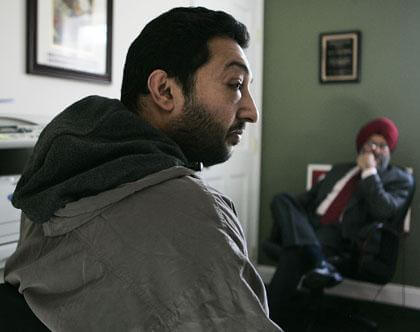By Anna Gustafson
For Bellerose resident Balbir Singh, New Year’s Eve was not a time of celebration.
After a violent attack outside his home on 248th Street in Bellerose that left blood gushing from his right eye, Balbir Singh, 40, spent nearly nine hours on Dec. 31 and Jan. 1 at the Long Island Jewish Medical Center.
The man, whom Community Board 13 member Swaranjit Singh said was the victim of a hate crime because he is a Sikh, cannot go back to work as a taxi driver for at least a week as the result of the injuries he sustained during the attack. He suffered a fracture in his right eye socket.
“My wife and I were moving out of our house, and we had moved everything out and were cleaning the house,” Balbir Singh said. “I came outside and some guy who was standing on the corner came and punched my head and my eye.”
“The doctor said I was very lucky,” he added. “I could have gone blind.”
Balbir Singh filed a police report, but he is not currently pressing charges against anyone because he was unable to see who his masked attacker was. Community members, however, said they plan to post fliers throughout the neighborhood asking for information about the assailant.
“I was very upset when I heard about his eye,” said Bellerose resident Abhijit Rikhy, a law student at St. John’s University and Swaranjit Singh’s son, who plans to help put up the fliers. “This is a criminal offense.”
Swaranjit Singh, who is running for the 23rd City Council District seat, now held by Councilman David Weprin (D−Hollis), said the event was one of several attacks, verbal and physical, that Sikhs have suffered in the neighborhood. The community board member said Sikhs, some of whom wear turbans on their heads, are often mistaken for Muslims and have been especially targeted after Sept. 11, 2001.
Many Sikhs come from the state of Punjab in India and wear the turban, also called a Dastar, to cover their long hair. For Sikhs, the turban represents honor, self−respect, courage and spirituality. Sikhism is a monotheistic religion and is the fifth−largest organized religion in the world.
“There is a lot of ignorance, ignorance creates fear and fear creates hatred,” Swaranjit Singh said. “There is a need for tolerance and respect.”
Over the past several years, the Indian population has grown in the Community Board 13 area, which includes Bellerose, Queens Village, Glen Oaks, New Hyde Park, Cambria Heights, Laurelton, Rosedale and Floral Park.
In 2000, South Asian residents, including individuals from India, Pakistan and Bangladesh, made up about 25.2 percent of the community’s population. As of 2008, that percentage has increased to approximately 37 percent.
“I have had people tell me, ‘You people are changing everything in the neighborhood,’ ” Swaranjit Singh said. “The average person will be very nice, but people will still be ignorant. The demographics have changed so much and people don’t want to accept things are changing. Indians work very hard, and they want to make their community a better place.”
Though Balbir Singh said he had never encountered any problems with neighbors or other community residents before, Swaranjit Singh and Abhijit Rikhy said it was not uncommon for some people to lob slurs at Sikhs or even physically attack them. This past summer, hundreds of members of the Sikh community held a protest outside of Richmond Hill High School, where in June a Sikh student had been assaulted.
Jagmohan Singh Premi, an 18−year−old student, had been attacked by another student who tried to remove his turban. The attacker punched him in the face with a key that was between his knuckles, and Premi suffered a facial contusion and an orbital fracture of his left eye.
That same month, a student at PS 219 in Flushing cut the hair of fellow student, Gurprit Kaur, a Sikh.
To educate individuals about Sikhs and Sikhism, Swaranjit Singh travels throughout the city talking to police officers, schools and community groups.
Reach reporter Anna Gustafson by e−mail at agustafson@timesledger.com or by phone at 718−229−0300, Ext. 174.



































